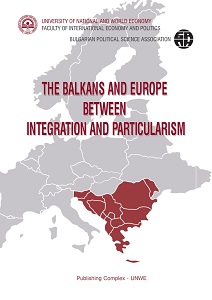The Balkans in the New Energy Architecture: Political and Economic Dynamism
The Balkans in the New Energy Architecture: Political and Economic Dynamism
Author(s): Elisabeth Yoneva
Subject(s): Politics / Political Sciences, Politics, Economy, Energy and Environmental Studies, Environmental and Energy policy, International relations/trade
Published by: Университет за национално и световно стопанство (УНСС)
Keywords: Balkans; ЕU; energy; oil; natural gas
Summary/Abstract: In the last decades, the subject of the development of the energy sector in the Balkancountries provokes special attention due to its relevance in the context of the changing geopolitical and geoeconomic landscape in Eurasia, as well as the transformations on a global level. The restructuring of the region represents an essential element in the shifting model of international relations, determining new roles and functions for the Southeast European states within the world system. They are facing the challenge to adapt to the new realities and the measures undertaken and planned to improve the national situation alter their diplomacy and especially their approaches towards different regions. In turn, this causes large spillover effects on international relations. In the light of these new developments, the paper explores the principal dimensions of the energy architecture in the Balkans and the resulting foreign policy implications, by comparing the strategies implied according to the correspondent national energy guidelines. The aim of the study is to contrast the various approaches, in order to assess their potential capacity, the crucial differences and the similarities between them, as well as their advantages and limitations. The analysis also showcases the main vectors of the interests of global players such as the EU, Russia, the US, China, and especially the resulting implications of their involvement in the region with emphasis on recent transformations. The author discusses different aspects of the significance of this zone as an energy junction and the ambitions of the Balkans to act as a bridge between East and West. Special attention is paid to the impact of the political approaches on the establishmentof regional patterns of energy cooperation or competition. Looking at the subject from the perspective of the evolutions in the last years, the paper investigates the endogenous and exogenous dynamics of the changing energy settings in Southeast Europe. The research work outlines the conceptual frame of the attempts of the Balkan countries at both bilateral and multilateral level to recalibrate their actions, in order to unlock the potential of the region as a stable partner, particularly with regard to energy supplies. Currently, the level of energy insecurity and vulnerability of the Balkan states remains high, albeit to varying degrees, and the successful elimination of the label "unstable energy architecture" for Europe’s East requires revised vision for the region that will envelop political and economic dimensions of development.
Book: The Balkans and Europe between Integration and Particularism
- Page Range: 132-145
- Page Count: 15
- Publication Year: 2019
- Language: English
- Content File-PDF

